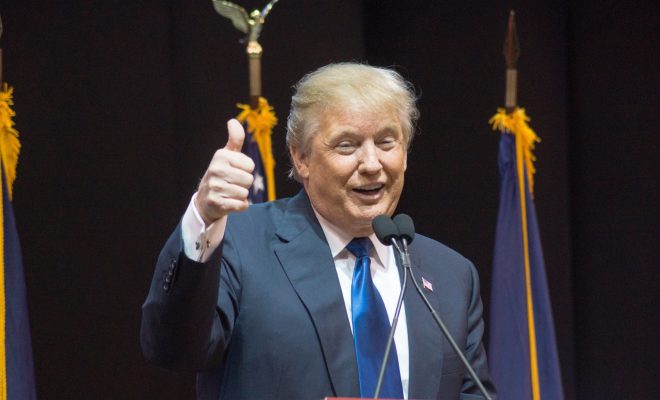 "Donald Trump" Courtesy of [Marc Nozell via Flickr]
"Donald Trump" Courtesy of [Marc Nozell via Flickr]
Politics
Did Donald Trump Use His Foundation’s Money to Settle Legal Disputes?
The latest from a series of investigative reports by The Washington Post reveals Donald Trump used over $250,000 of his charity’s funds to finance legal settlements tied to his businesses. The cases seem to indicate the Republican presidential nominee broke U.S. self-dealing laws, which, if the IRS finds him guilty of doing, could require him to pay penalty taxes as well as reimburse the Donald J. Trump Foundation for the money he pilfered for personal expenditures.
For example, in 2007, the town of Palm Beach, Florida began fining Trump’s beachfront Mar-a-Lago property over $1,000 per day because it flouted a town ordinance stating flagpoles could reach no higher than 42 feet. Trump erected an American flag standing 80 feet high. Palm Beach settled the issue by requiring Trump to make a $100,000 donation to the Fisher House charity, which benefits veterans and their families. Trump sent the charity a check for the proposed amount. Examining his charity’s tax filings, the Post found that the check used funds from the Donald J. Trump Foundation.
A previous Post investigation found Trump hardly contributes to his own charity so, in effect, he used contributions from other donors to fund some legal disputes. There was a second major case in which Trump seemingly dug into his foundation’s coffers for settlement money: in 2010, during a charity tournament at Trump’s golf course in Westchester County, New York, a man hit a hole-in-one on the 13th hole, a feat promising a $1 million prize. But the fine print of the rules rendered Martin Greenberg, the man who hit the hole-in-one, prize-less. He sued. Trump’s course settled with Greenberg, who demanded Trump donate to his charity, the Martin Greenberg Foundation. Trump sent a check of $158,000 from his own foundation.
A real headline about the Republican nominee: “Trump used $258,000 from his charity to settle legal problems.” https://t.co/2LRtZB3Ri2
— Hillary Clinton (@HillaryClinton) September 21, 2016
IRS self-dealing laws include the following language: “Paying compensation or reimbursing expenses by a private foundation to a disqualified person is generally an act of self-dealing.” At the moment, the New York attorney general’s office is looking into Trump’s actions to determine if he broke the state’s charity laws.
There are other instances where Trump used his foundation’s money to fund personal items: $5,000 toward ads for his hotel chains in 2013, $10,000 for a portrait of himself in 2014, and $12,000 for a football helmet signed by former NFL player Tim Tebow in 2012.
Trump’s campaign issued a statement on Tuesday night, saying the Post had “gotten their facts wrong,” and wrote the story as a way of directing attention away from the “corrupt Clinton Foundation.” The statement went on: “There was not, and could not be, any intent or motive for the Trump Foundation to make improper payments. All contributions are reported to the IRS, and all Foundation donations are publicly disclosed.” It is unclear what the Post story got wrong, and what “inaccuracies and omissions” it contained. The statement did not make any specific references, while calling the man who wrote the story, David Fahrenthold, a “biased reporter.”








Comments